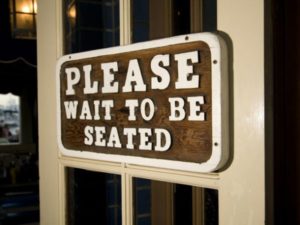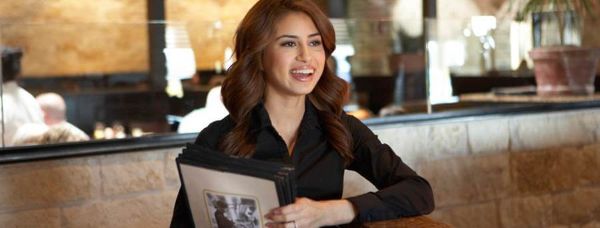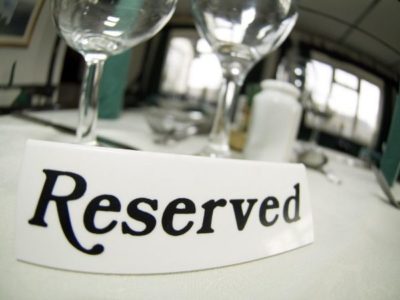With gender inequality under scrutiny, the restaurant industry has been forced to take a long, uncomfortable look at itself in the mirror. The reflection hasn’t been very flattering. Despite all of this overdue introspection, though, we’ve ignored the part of a restaurant that has the worst gender imbalance: The Host Stand. Stationing attractive women as hostesses at the front door is one of the oldest and most misogynistic conventions of the modern restaurant and yet, by all accounts, its prevalence hasn’t provoked nearly the same outrage as the subjugation of female chefs in the kitchen.
Go into any of your city’s top restaurants and invariably you’ll be greeted at the door by a young, attractive woman. If a man greets you, he is likely a maitre d, who has greater responsibilities like managing the reservation book, configuring seating arrangements and overseeing guest relations; he will rarely leave the podium to shepherd guests to their tables. Of course, there are many female maitre d’s in the industry too, but you won’t see many of them flanked by male hosts in the way that gaggles of hostesses often surround male maitre d’s like Charlie’s Angels. Unlike their male counterparts, female maitre d’s will often have their authority questioned by male patrons who see a woman’s face at the door and assume she’s just a hostess.
 As we delve deeper into the dysfunctions of our industry and its antiquated attitudes toward gender, it’s about time we question the standard practice of displaying hostesses as showpieces. Whereas most other positions in the restaurant are measured by competence, hostesses are hired and judged primarily by their looks. Since restaurant managers are overwhelming male, female candidates for door positions are often scrutinized like beauty pageant contestants. Restaurants like The Coffee Shop in New York City are notorious for only hiring models to work as hostesses. Of course, the visibility these women receive may open doors for their modeling careers but what about the hard-working, non-model applicants who were discriminated against?
As we delve deeper into the dysfunctions of our industry and its antiquated attitudes toward gender, it’s about time we question the standard practice of displaying hostesses as showpieces. Whereas most other positions in the restaurant are measured by competence, hostesses are hired and judged primarily by their looks. Since restaurant managers are overwhelming male, female candidates for door positions are often scrutinized like beauty pageant contestants. Restaurants like The Coffee Shop in New York City are notorious for only hiring models to work as hostesses. Of course, the visibility these women receive may open doors for their modeling careers but what about the hard-working, non-model applicants who were discriminated against?
Restaurants tend to recruit college-age women looking for part-time income. Hostess jobs pay poorly but they attract students who have classes during the day and can only work nights. Whether they admit it or not, restaurant managers (even female ones) will often hire more attractive women with less restaurant experience over less attractive women who have more. Management may also enforce strict dress codes for their hostesses like requiring they wear heels on the floor or specific-length skirts and dresses. These strict uniform guidelines rarely apply to male staff members.
Young women with limited professional experience can struggle dealing with inappropriate behavior by male supervisors or patrons. Hostesses become defenseless targets when male VIPs or investors leverage their preferred status to solicit favors or special treatment. Since hostesses are trained to be obsequious, their affability is often misconstrued as interest. Rejecting the attention of an important male client or refusing to comply with a male supervisor’s demands may threaten their job security.
In one of the most public cases of restaurant harassment, Martha Nyakim Gatkuoth—a 25 year-old Ethiopian runway model who worked as a hostess at Tavern On The Green—filed a lawsuit in 2008 alleging improprieties by management that resulted in a multi-million dollar settlement. According to the complaint, female hostesses were pressured to perform sexual acts by management and threatened with punitive action if they refused. After the Manhattan District Attorney dropped the criminal case, the E.E.O.C. intervened on behalf of over fifty workers who corroborated her story of institutionalized abuse before the case was settled out of court. It’s hard not to look back on this case as a harbinger of the #MeToo movement but also wonder why it took so long for women like Ms. Gatkuoth to have their voices heard.
 As long as we continue to objectify hostesses and train them to be docile, their voices will continue to be muffled. If we want women to be featured more prominently in restaurants, then we must acknowledge the fact that their most visible role is a passive one. In the same way that management has lagged behind in hiring more women in key FOH positions, restaurants need to diversify their door staff to include more men. Changing the gender dynamic at the entrance of a restaurant sends a strong message to guests that the owners care about hiring the most qualified people, not just a pretty face.
As long as we continue to objectify hostesses and train them to be docile, their voices will continue to be muffled. If we want women to be featured more prominently in restaurants, then we must acknowledge the fact that their most visible role is a passive one. In the same way that management has lagged behind in hiring more women in key FOH positions, restaurants need to diversify their door staff to include more men. Changing the gender dynamic at the entrance of a restaurant sends a strong message to guests that the owners care about hiring the most qualified people, not just a pretty face.



 You need a connection to get in – Some restaurants like Rao’s in New York City only open their doors to insiders. You either know someone who has a table there or you’re eating somewhere else. Loyalty is the best way to build these relationships. That’s how they did it back in the day at Rao’s and that’s how they do it now everywhere else. Don’t expect preferred status without earning it. Restaurant relationships are just like relationships you have with significant others. Expecting intimacy without trust leads to rejection. Take time to get to know the staff, tip them well and eventually, if you’re lucky, they’ll be ready to consummate the relationship.
You need a connection to get in – Some restaurants like Rao’s in New York City only open their doors to insiders. You either know someone who has a table there or you’re eating somewhere else. Loyalty is the best way to build these relationships. That’s how they did it back in the day at Rao’s and that’s how they do it now everywhere else. Don’t expect preferred status without earning it. Restaurant relationships are just like relationships you have with significant others. Expecting intimacy without trust leads to rejection. Take time to get to know the staff, tip them well and eventually, if you’re lucky, they’ll be ready to consummate the relationship.